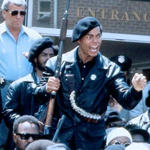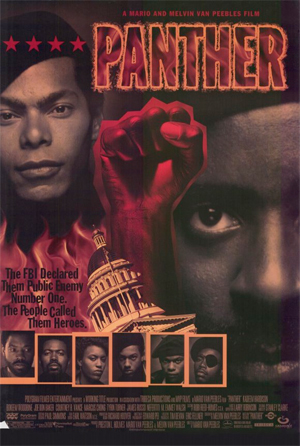 PANTHER, directed by Mario Van Peebles, written by his dad Melvin Van Peebles based on his own novel, shows the formation and rise and dissolution of the Black Panther Party For Self Defense. That last part of the name is usually left off, which makes sense because it sounds a little awkward. But if they left it on it would make it a little harder to pretend they’re the Kill Whitey Committee.
PANTHER, directed by Mario Van Peebles, written by his dad Melvin Van Peebles based on his own novel, shows the formation and rise and dissolution of the Black Panther Party For Self Defense. That last part of the name is usually left off, which makes sense because it sounds a little awkward. But if they left it on it would make it a little harder to pretend they’re the Kill Whitey Committee.
This is a ’60s period piece made 20 years ago and never even released on DVD in the U.S. as far as I can tell, but it’s timely and provocative because it’s about a community that gets fed up with the shit end of the stick and tries to figure out a better way to deal with it. It opens with a boy riding his bike, taking in the sights of his Oakland neighborhood. He and an older man both watch in delight as a bus blasts by a dressed up lady at a bus stop, blowing her skirt up like Marilyn Monroe. They love that they get to see her garters, and don’t seem to notice that some racist bus driver didn’t stop to pick her up. The innocence of childhood. Nostalgic first person narration is telling us this is where it all started, so it’s a bit of a shock when that kids gets nailed by a car.
He’s not the narrator as a child, it turns out. He’s the dead kid who convinced everybody that they could no longer take “No, you don’t need a stop light at that intersection” for an answer.
Dr. King’s methods of non-violent protest that we saw in SELMA are already in place, so the local church folk know what to do: block the street, carry signs, sing and chant, get beaten by cops and/or arrested, similar to what we do to this day (although sadly we don’t usually dress as nice). But Huey Newton and Bobby Seale think more accountability of the police at these protests is needed, so they show up with pads of paper specifically to observe and write down badge numbers. But the cops cover up their badges – again, same thing they do to this day (but they’re dressed nicer now, if you like armor).
 This frustration leads to a new approach that has one major overlap with what certain fringe groups are doing now: open carry. Walking around with big rifles in public at all times. For the people who do it today it’s to protest the potential far future adoption of non-insane gun laws if the gun lobby ever loses control of politicians within our lifetime, which of course it will not, because they have the guns. In the case of the Black Panthers though it was an extreme response to an actual, existing threat: police knowing they can easily get away with killing black people.
This frustration leads to a new approach that has one major overlap with what certain fringe groups are doing now: open carry. Walking around with big rifles in public at all times. For the people who do it today it’s to protest the potential far future adoption of non-insane gun laws if the gun lobby ever loses control of politicians within our lifetime, which of course it will not, because they have the guns. In the case of the Black Panthers though it was an extreme response to an actual, existing threat: police knowing they can easily get away with killing black people.
So, yeah. Shit. Again, history repeats itself. I honestly can’t imagine what would happen if today’s black activists started carrying guns like this. They would for sure get shot by police immediately, right? Like the poor guy that got mistakenly called in for picking up a toy gun in a store? So how did that not happen back then, when racism was more blatant? Also, how would gun rights advocates explain not jumping to the defense of the black militants’ 2nd Amendment rights? I guess it just wouldn’t occur to them.
Along with the open carry Huey promotes learning about all of your legal rights and state laws and asserting them (sometimes annoyingly) whenever police try to violate them. Which happens much more often after they become an established group.
In many ways it’s a pretty standard biopic type of feel, entertainingly going through the Black Panther Greatest Hits, the legal entanglements, etc. But the book it’s based on is historical fiction. So as much as we learn about the actual Black Panther Party founders, we see it through the eyes of a fictional neighborhood friend, Judge, who adds more drama by becoming a double agent, supposedly working for a cop (Joe Don Baker), but giving info to Huey, while nobody else is allowed to know. And that causes suspicion and tension within the group. It’s weird to take that kind of artistic license, but it’s a pretty effective story if you’re willing to just go with it.
I haven’t been mentioning who plays who because I wanted to deal with that all at once. Everybody from 1995 is in this movie, in my opinion. First of all, the protagonist, Judge, is played by Kadeem Hardison. I could be a smart ass and pretend we all know him from the Mark Dacascos movie DRIVE, but of course he’s Dwayne Wayne, lovable comic relief sidekick turned star of A Different World (one of his TV co-stars, Jenifer Lewis, is also in this). I forgot that there was a time when he could take the flip-up sunglasses off, grow a beard and play a tough Vietnam vet. I guess he didn’t get too many chances at that. But I like him in this.
Then you got Bokeem Woodbine (RIDDICK, Blade: The Series) as Tyrone, the other fictional main character, the guy who gets too macho and takes things too far and clashes with Judge and then starts to hate him when he (correctly) suspects he’s a cop but then they earn each other’s respect or whatever. Basically, he’s playing the Bokeem Woodbine character.
You got Bobby Brown and Chris Rock playing some of the local hoods. You got Kool Moe Dee (no sunglasses) playing the main Panthers’ more afrocentric, dashiki wearing friend Jamal. You got the rapper Yoyo in a brief but memorable scene as “Pregnant junkie.” Somebody named “Nefertiti” is in it too, so I’m gonna guess she’s a rapper that I don’t remember (the Wikipedia link goes to the Egyptian queen, but if I recall correctly she passed away well before 1995). Old timers include Melvin Van Peebles and Dick Gregory. White people besides Joe Don Baker include M. Emmet Walsh, James Le Gros, Robert Culp and Michael Wincott as a drug kingpin. Chris Tucker has an early role as “Bodyguard.” This came out a month after FRIDAY, but must’ve filmed before, because I think he’s only in two crowd scenes, and in the one where he starts talking he gets shut up immediately.
And then what I’m most interested in is the people who play the historical figures. There’s a scene where they act as security for Betty Shabazz, and she’s played by Angela Bassett, a cool stunt since she’d already played her in MALCOLM X. Bobby Seale is played by Courtney B. Vance, Eldridge Cleaver by Anthony Griffith, Bobby Hutton by Wesley Jonathan, Huey Newton (sort of the main character) by Marcus Chong, a.k.a. Tank from THE MATRIX. Roger Guenveur Smith (DO THE RIGHT THING, MERCENARY FOR JUSTICE) just plays some fictional FBI prick, but he later played Huey Newton in a one man show that Spike Lee made a movie out of. And had been in MALCOLM X already. Mario Van Peebles has a small role as Stokely Carmichael, and please note that he later played Malcolm X in ALI.
There’s a minor but interesting thread in here about the Black Panthers being at least a little more progressive with women than some of the other militant groups. There’s a rival group of activists who wear African clothes and have the women bring them water and stuff. When those women come try to join their group as equal members they’re a little taken aback but figure yeah, why not? Unfortunately this isn’t really explored much further in the movie, but the torch is taken up by a song on the soundtrack that has a video included after the movie on the VHS tape. It’s called “Freedom (Theme from Panther)” and I can’t believe I never heard this song. As the video unfolds and you’re trying to figure out who it’s by you figure out that it’s TLC but also Mary J. Blige but also Vanessa Williams and isn’t that Salt-N-Pepa and also Queen Latifah, SWV, Zhane, Aaliyah, and I don’t know who the other couple dozen are. Yes, it’s the “We Are the World” of black women singers and rappers circa 1995, with “over 60 African-American female artists and groups of note in hip-hop, pop and R&B music” according to its wikipedia entry. The coolest kinda obscure one I noticed was Me’Shell N’degeocello. Do you know who that is? This badass little bald lady here:
She raps a little and does a bass solo on the Panther song, I thought that was pretty cool. There’s also an all rap version on Youtube that adds Yo Yo, extra Me’Shell, Lyte and Salt-N-Pepa, and a pretty good verse by Left Eye.
This is a movie with a strong heart and it delves into a part of history that has been too ignored or misconstrued by popular culture. So even when it’s not working I couldn’t help but root for it. It’s from a time when black filmmakers were starting to (briefly) proliferate and tell black stories. They could tell this one without the white point of view character that was standard in the ’80s. I guess there’s a scene thrown in for us where some white hippies want to become Black Panthers, and it doesn’t make a joke out of them. They’re just told that their support is appreciated but that the party is about black people doing it themselves. And nobody cries about it.
Baker’s cop character is interesting and – surprising for a character played by Joe Don Baker – full of nuance. He knows all the law enforcement harassment of these people is bullshit and sometimes tries to do the right thing, but sometimes he still goes along with the program, since it’s easier. He’s not a monster but not a secret good guy either. Unfortunately alot of the other white establishment characters are completely one-dimensional, and that dimension is “villain.” They act like they know they’re the bad guys and revel in it, which makes the movie seem less credible as an impression of historical truth.
The Black Panthers are interesting to me. Obviously their solution wasn’t the one, because here we are. The system fought back and things ended badly for most of them. And I’m not for any solution that involves everybody carrying guns around. Swords, maybe.
But what the fuck else were they supposed to do? They tried, and they made The Man piss a little, and they did alot of good in the neighborhoods that the government or the rich benefactors weren’t gonna fucking do. Their legacy was big enough that Fox News trots them out as the boogie man every election cycle (supposedly somebody called “The New Black Panthers” terrorized threw the election by having a dude in a beret stand near a polling place somewhere). And Tupac’s mom being a Black Panther has always represented the political side of his personality. So it’s good that the new generation has an accessible way to find out about what they were about. They can, uh, find a tape of this on ebay and… or if it comes back on Netflix, or whatever. You know, I feel like maybe there hasn’t been a huge effort to make this one widely available.
But the other thing I enjoyed about watching this is that even though it’s a period piece it also made me nostalgic for the ’90s. The actors, the music, but mostly the attitude. The yearning to show how these old ideas were relevant, to inspire the youth, to make the world better. It was when Mario Van Peebles was a viable director/actor and Melvin Van Peebles was respected as an elder and did you know that their initials are MVP, that’s something I learned from my notes. But together they were bringing a bit of that ’60s radicalism into the movie side of the hip hop era. BOYZ N THE HOOD and MENACE II SOCIETY had started a small wave of “hood movies” about ghetto strife and why people turn to gangs and stuff. But the MVPs were showing a potentially more constructive way to channel the frustration and aggression.
I don’t know, I hope some young musicians and moviemakers I don’t know about are out there somewhere cooking up a cultural response to the shit the world is throwing at us these days. And hopefully it will have more of an impact than PANTHER did. But until then, dust off your VCRs I guess. Do you kids like En Vogue? Let me show you something.
1/15/15 UPDATE: Seeing the Oscar nominations and more discussion about SELMA made me think about an obvious thing to appreciate about PANTHER that I didn’t think to put in this review. We’re used to seeing prestige, Oscar season type movies about racism, the civil rights movement and historic figures. It’s less common to do what the MVPs tried to do here, a movie about all these issues that’s also trying to be sort of an entertaining, pulpy thriller. It’s not entirely successful and clearly it didn’t connect with young people the way they hoped, but I like that they gave it a shot.



























January 15th, 2015 at 11:17 am
I really wish I had access to this. These reviews are really important, and I’m glad someone is out there writing them.